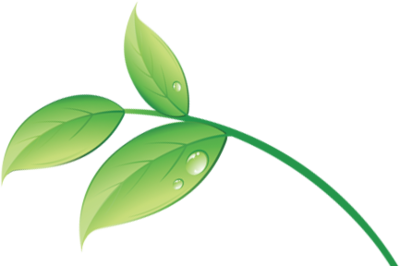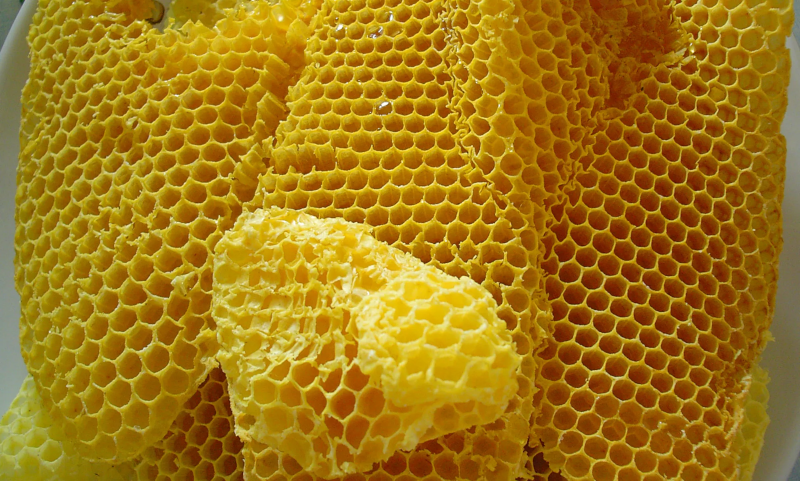What is beeswax
Beeswax (cera alba) is a natural wax produced by honey bees of the genus Apis. The wax is formed into scales by eight wax-producing glands in the abdominal segments of worker bees, which discard it in or at the hive. The hive workers collect and use it to form cells for honey storage and larval and pupal protection within the beehive.
Chemically, beeswax consists mainly of esters of fatty acids and various long-chain alcohols.
Its composition varies among bee species and geographical zones, and includes hydrocarbons, of which major ones are heptacosane, nonacosane, hentriacontane, pentacosane and tricosane, free fatty acids and free fatty alcohols, linear wax monoesters, hydroxymonoesters deriving from palmitic, 15-hydroxypalmitic, and oleic acids, and complex wax esters containing 15-hydroxypalmitic acid and diols (Münstedt and Bogdanov, 2009). A total of about 50 aroma components has also been reported (Ferber and Nursten, 1977).
Dermatological and Cosmetic Properties
Beeswax has been known as a major Ayurvedic remedy for inflammation, bruises, burns, and cracked heels (Gokani, 2014). Ointments based on beeswax useful for joint pain, wounds and burns, are reported in the Ebers Papyrus (about 3500 B.P.), by the Greek-Roman physician Galen (about 2150 B.P.), and in old texts of traditional Chinese medicine, such as the “Shen Nong Book of Herbs” (about 2100–2200 B.P.) (Rit and Behrer, 1999).
Sterols in beeswax give its lubricating, softening activities and reduce transepidermal water loss from skin.
Squalene, 10-hydroxy-trans-2-decenoic acid and flavonoids (chrysin) provide antiseptic properties to this product, and protect the skin against pathogenic microorganisms. Beeswax constitutes a protective barrier against many external factors by forming a film on the skin surface. β-carotene present in beeswax is a valuable source of vitamin A, into which it is converted. Vitamin A delays collagen degradation, stimulates mitotic division in the epidermis, thus leads to sooner regeneration of the skin after damage [34, 36].
Beeswax is anti-allergenic, anti-inflammatory, anti-oxidant, anti-bacterial and germicidal. These properties make beeswax a highly stable base ingredient, thus extending the product's life. But importantly, this makes beeswax particularly beneficial for those with sensitive skin as beeswax will unlikely cause skin irritation.
Benefits
- Beeswax is completely natural, meaning that it can't harm your skin in any way.
- Additionally, beeswax is a great emollient for dry skin. Emollients hydrate our skin, soothing it and reducing any discomfort it may be experiencing.
- The specific molecular composition of beeswax allows it to form a protective barrier over, and around the skin. This protective barrier also locks in all of the skin's moisture in place.
- Being an excellent source of Vitamin A, beeswax is essential for great skin.
- Beeswax even attracts water molecules, helping your skin get that extra essential moisture it needs.
Beeswax Uses
Beeswax has been used since ancient times for its antimicrobial properties in European and Asian traditional medicines.
It had also a long tradition of cosmetic use, with even the ancients using it to remove hair from the skin. But that’s not all - beeswax was also the first ingredient in the history of mankind used as a plastic and serving as a waterproofing and lubricating agent. Additionally, beeswax has been used as a polishing substance for leather, wood (especially in shipbuilding), as an additive in artistic paints as well as, of course, in the production of candles.
Now, thanks to its very low irritant and comedogenic effects, beeswax is widely used in modern cosmetics and makeup as a thickener, emollient and emulsifier (Münstedt and Bogdanov, 2009).
The palette of beeswax use in skincare is being increasingly broadened. Skincare products that employ beeswax today come in different shapes and perform different purposes. Beeswax is used in quality moisturizers, various skincare gels, creams and ointments, and last but not least, many makeup products. However, beeswax remains an unlikely, fringe product, which makes many people oblivious to its use and benefits.
Sources
- https://en.wikipedia.org/wiki/Beeswax
- https://www.ncbi.nlm.nih.gov/pmc/articles/PMC7036894/
- https://www.beecosmetics.co.uk/post/beeswax-skincare-benefits
- https://misumiskincare.com/blogs/news/11-amazing-skin-benefits-of-beeswax
- Münstedt and Bogdanov, 2009
- Ferber and Nursten, 1977
- Gokani, 2014
- Rit and Behrer, 1999
- 34
- 36

